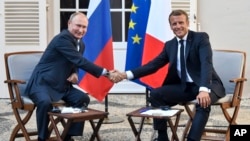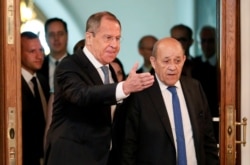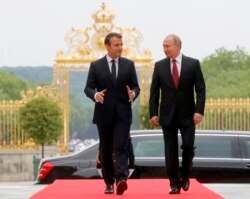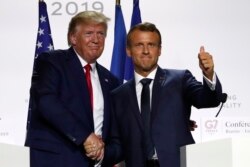Two years ago, France’s Emmanuel Macron was widely seen as the most bellicose of Western leaders when it came to confronting Moscow over its annexation of Crimea and its fomenting of violent separatism in the Donbas region of Ukraine.
Now, he is heading calls for Russia to be brought back into the Western fold, and his diplomatic outreach is making some of France’s allies nervous.
On Monday, French Foreign Minister Jean-Yves Le Drian dubbed a landmark prisoner exchange between Russia and Ukraine as a “window of opportunity” to ease tensions. Speaking just 48 hours after Moscow and Kyiv exchanged a total of 70 prisoners, he said “the time is right to work toward reducing the distrust between Russia and Europe, who ought to be partners on a strategic and economic level.”
Le Drian welcomed “a new state of mind, which we have not seen for several years.”
Accompanied by French Defense Minister Florence Parly, Le Drian held talks in Moscow this week — the first time such senior ministers have visited the Russian capital since the 2014 Russian annexation of Crimea from Ukraine — as part of an effort to reset East-West relations.
The search for detente was kicked off by Macron in August when he hosted Russia’s President Vladimir Putin at the French president’s summer residence on the Riviera.
It is a far cry from 2017 when fresh from an election victory in which he beat two pro-Kremlin challengers, Macron took Putin to task for a host of actions at a joint press conference at the palace of Versailles.
Standing beside an uneasy-looking Putin, Macron blasted Russia for seeking to meddle in Western elections by spreading fake news, disinformation and falsehoods. He condemned the brutal tactics, including the use of chemical weapons, allegedly employed by the Moscow-partnered Syrian government to regain control over the war-torn Middle East country.
Macron talked about “very clear lines” of behavior. But since August, the lines appear a little less clear for Macron, say his critics.
Allies dubious
The French leader’s abrupt about-turn is prompting nervousness in London and some other Western European capitals. Since last month’s G-7 summit, during which U.S. President Donald Trump called for Russian readmission to the exclusive club — a membership it was excluded from because of the annexation of Crimea — Macron has pressed on with his courtship of Putin.
“Pushing Russia from Europe is a profound strategic error,” Macron said in a sweeping diplomatic speech last month. “It's not in our interest to be weak and guilty, to forget all our disagreements and to embrace each other again,” he said. However, “The European continent will never be stable, will never be in security, if we don't pacify and clarify our relations with Russia.”
Macron said Europe has to avoid being caught in the middle of a new Cold War, while also checking Russia’s global ambitions. He has not called for a lifting of Western sanctions on Russia, but says he doesn’t support the calls for the imposition of any fresh ones.
For some critics, Macron’s attempted reset is as much about his personal ambitions and his aim to boost his role in international affairs as anything else. Macron has sketched out a grandiose role for France as a “balancing power” between Russia and its rivals, between the U.S. and Iran, between wealthy nations and poor countries.
His diplomatic forays have been met with mixed success. His bid last month to get the U.S. and Iran to sit down for talks during the G-7 summit failed after he invited the Iranian foreign minister as a surprise guest. Macron said he had hoped his risky diplomatic maneuver might help create “the possible conditions of a useful meeting.”
How his bid to reset East-West relations will fare is unclear. But it isn’t impressing some of France’s European allies, including the Dutch and Russia’s near neighbors on the east of the continent.
“Many countries, especially those that are not Russia’s closest neighbors, are keen to ignore the fact that Russia has not really changed its way,” Pawel Jablonski, an adviser to the Polish prime minister, told Britain’s Financial Times.
Poland Foreign Minister Jacek Czaputowicz recently warned that Macron is trying to return to the days of Gen. Charles de Gaulle, the iconic French leader who attempted to be a broker between the Soviet Union and the United States. He fears that Macron’s path eventually would lead to the Europeans placing themselves as an equidistant power between Moscow and Washington.
British officials say Macron’s efforts to broker a rapprochement are premature, given the poisoning last year on British soil of Russian defector Sergei Skripal and his daughter, Yulia. London has accused Russia’s military intelligence service, the GRU, of carrying out the poisoning, which prompted the imposition of further international sanctions on Russia.
On Tuesday, a top British commander, Gen. Patrick Sanders, urged the government to set up a round-the-clock national crisis center because Britain is facing increasing hazards, especially from Russia, which is threatening to reignite “the Great Game, but on steroids.”
A major test of Macron’s reset gambit will come in the next few weeks. France has called an EU summit with Russia on the Ukraine conflict following Saturday’s prisoner exchange.
“The two presidents confirmed that the current momentum will allow for the holding, in the next few weeks, of a summit under the Normandy format in Paris,” Macron's office said Sunday after the French leader spoke with Putin by phone.
“There is an opportunity, a door opened, to start making progress toward settling this conflict,” Le Drian told French radio earlier this week.
Some Western security officials are less sanguine.
Kurt Volker, U.S. special envoy for Ukraine negotiations, has called for more prisoner swaps, a renewed cease-fire that is actually observed in eastern Ukraine, and an adherence to agreements for de-escalation that were agreed in Minsk in 2014.
While welcoming talks, U.S. Defense Secretary Mark Esper expressed skepticism Saturday.
“It would be great if we could get Russia to behave like a more normal country. But you also can't ignore the last many years of history where Russia has invaded Georgia. It has annexed Crimea. It is occupying parts of Ukraine. It is threatening the Baltic states,” he said.
For Chatham House analysts James Nixey and Mathieu Boulègue, Macron is engaging in an “unwise aspiration of ‘winning Russia round,’” which they say overlooks principles and evidence.
In a commentary for the London-based think tank, the two highlighted the recent Kremlin crackdown on pro-democracy demonstrators.
“A country that is ramping up repressive actions against its own citizens who dare to stand up for themselves is sadly — but logically — not fit to be ‘back’ with Europe [and it is not certain that they were ever together]," they said.








